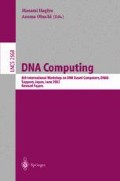Abstract
The motivation for the development of splicing theory is recalled. A ttention is restricted to finite splicing systems, which are those having only finitely many rules and finitely many initial strings.Languages generated by such systems are necessarily regular, but not all regular languages can be so generated.Th e splicing systems that arose originally, as models of enzymatic actions, have two special properties called reflexivity and symmetry.We announce the Pixton-Goode procedure for deciding whether a given regular language can be generated by a finite reflexive splicing system.A lthough the correctness of the algorithm is not demonstrated here, two propositions that serve as major tools in the demonstration are stated.One of these is a powerful pumping lemma.Th e concept of the syntactic monoid of a language provides sharp conceptual clarity in this area.We believe that there may be yet unrealized results to be found that interweave splicing theory with subclasses of the class of regular languages and we invite others to join in these investigations.
Access this chapter
Tax calculation will be finalised at checkout
Purchases are for personal use only
Preview
Unable to display preview. Download preview PDF.
References
L. Adleman, Molecular computation of solutions of combinatorial problems, Science 266(1994)1021–1024.
J. Almeida, Finite Semigroups and Universal Algebra, World Scientific, Singapore (1994).
P. Bonizzoni, C. De Felice, G.M auri, R. Zizza, On the power of linear and circular splicing systems, (submitted).
P. Bonizzoni, C. De Felice, G. Mauri, R. Zizza, Decision problems for linear and circular splicing, DLT2002 volume of LNCS (to appear).
P. Bonizzoni, C. De Felice, G. Mauri, R. Zizza, The structure of reflexive splicing languages via Schutzenberger constants, (submitted).
K. Culik II, T. Harju, The regularity of splicing systems and DNA, in: Proc. ICALP’ 89, LCNS 372(1989)222–233.
K. Culik II, T. Harju, Splicing semigroups of dominoes and DNA, Discrete Appl. Math. 31(1991)261–277.
A. DeLuca, A. Restivo, A characterization of strictly locally testable languages and its application to subsemigroups of a free semigroup, Inform. and Control 44(1980)300–319.
K.L. Denningffho., R. Gatterdam, On the undecidability of splicing systems, Inter. J. Computer Math. 27(1989)133–145.
R.W. Gatterdam, Splicing systems and regularity, Inter. J. Computer Math. 31(1989)63–67.
T. E. Goode Laun, Constants and Splicing Systems, Dissertation Binghamton University, Binghamton, New York(1999).
T. Head, Formal language theory and DNA: an analysis of the generative capacity of specific recombinant behaviors, Bull. Math. Biology 49(1987)737–759.
T. Head, Splicing representations of strictly locally testable languages, Discrete Appl. Math. 87(1990)139–147.
T. Head, Splicing languages with one-sided context, in: Gh. Paun, Ed., Biomolecular Computing — Theory and Experiment, Springer-Verlag (1998)269–282.
T.Head, Gh, Paun, D. Pixton, Language theory and molecular genetics: generative mechanisms suggested by DNA recombinations, Chapter 7, Vol.2 of: G. Rozenberg & A. Salomaa, Eds., Handbook of Formal Languages, Springer, Berlin (1997)295–360.
J. Kari, L. Kari, Context-free recombination, in: C. Martin-Vide & V. Mitrana, Eds., Where Mathematics, Computer Science, Linguistics and Biology Meet, Kluwer Academic Pub., Dordrecht (2001).
B. Lewin, Genes, (1st.ed.) Wiley, New York (1983).
A. Mateescu, Gh. Paun, G. Rozenberg, A. Salomaa, Simple splicing systems, Discrete Appl. Math. 84(1996)145–163.
R. McNaughton, S. Papert, Counter-free Automata, MIT Press, Cambridge, MA (1971).
Gh. Paun, G. Rozenberg, A. Salomaa, DNA Computing — New Computing Pardigms, Springer-Verlag, Berlin (1998).
J. E. Pin, Varieties of Formal Languages, Plenum Pub.Co. (1986).
D. Pixton, Regularity of splicing systems, Discrete Appl. Math. 69(1996)101–124.
H. Straubing, Finite Automata, Formal Logic, and Circuit Complexity, Birkhauser, Boston, MA (1994).
Author information
Authors and Affiliations
Editor information
Editors and Affiliations
Rights and permissions
Copyright information
© 2003 Springer-Verlag Berlin Heidelberg
About this paper
Cite this paper
Head, T., Pixton, D., Goode, E. (2003). Splicing Systems: Regularity and Below . In: Hagiya, M., Ohuchi, A. (eds) DNA Computing. DNA 2002. Lecture Notes in Computer Science, vol 2568. Springer, Berlin, Heidelberg. https://doi.org/10.1007/3-540-36440-4_23
Download citation
DOI: https://doi.org/10.1007/3-540-36440-4_23
Published:
Publisher Name: Springer, Berlin, Heidelberg
Print ISBN: 978-3-540-00531-5
Online ISBN: 978-3-540-36440-5
eBook Packages: Springer Book Archive

